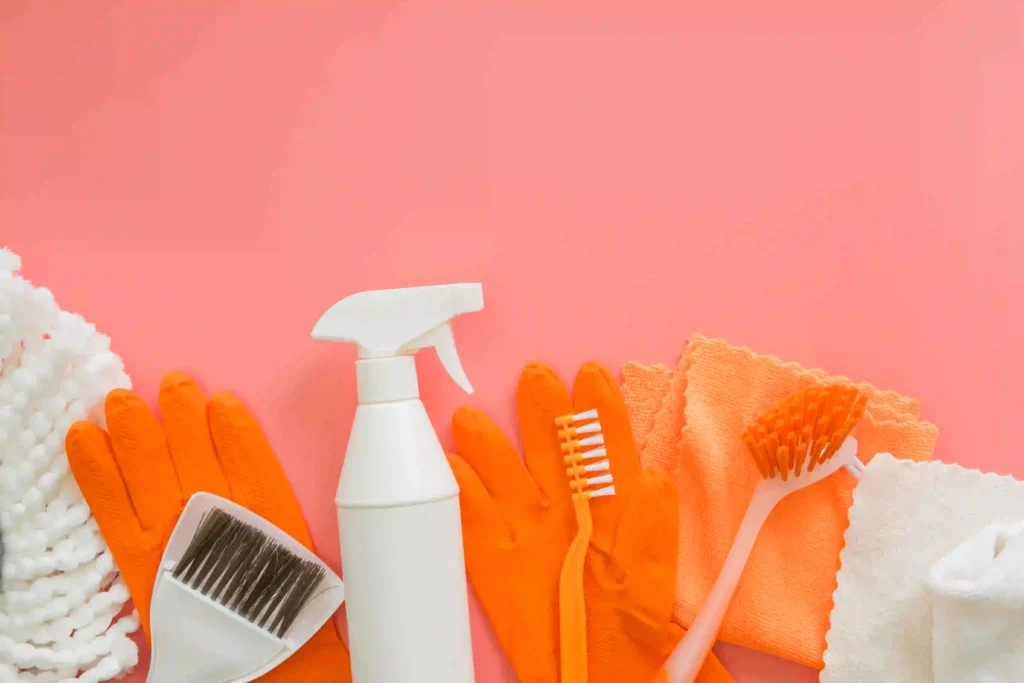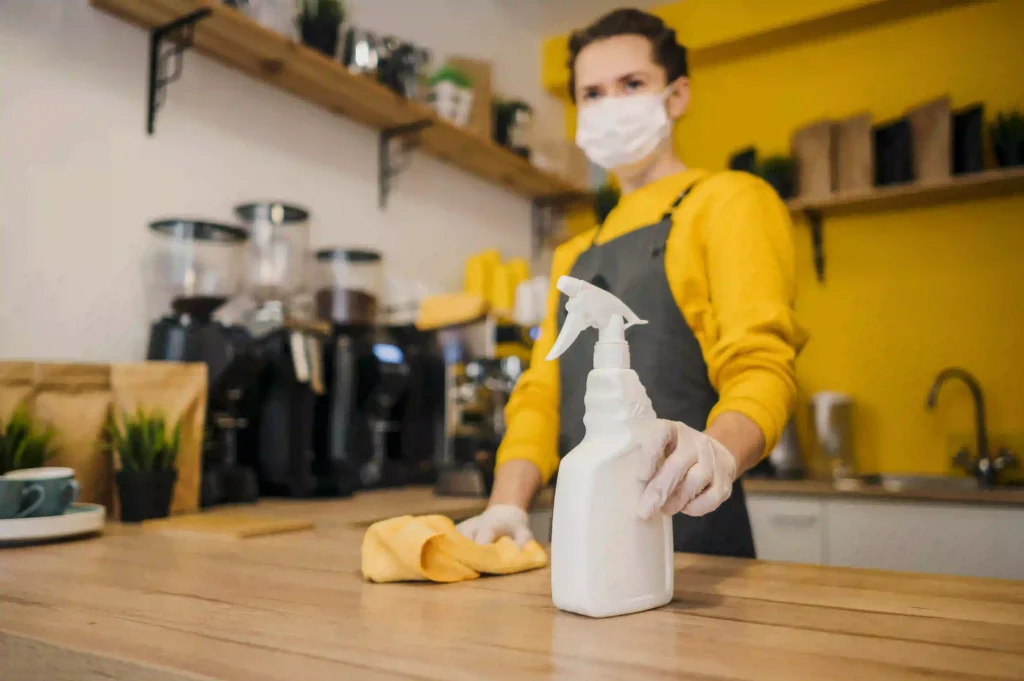1. Why Going Green with Your Cleaning Routine Isn’t Just for Show
Ever hesitated before spraying bleach on your countertop, sniffing the fumes, and wondering if there’s a better way? You’re not alone. Eco-friendly cleaning isn’t a fad, it’s a smarter, healthier choice for you and the planet. The global green cleaning product market is projected to surge toward $15 billion by 2027, with consumers driving its growth—85% of respondents say they prefer eco-friendly cleaners. Better yet, eco cleaning can slash indoor volatile organic compounds (VOCs) by up to 50%, significantly improving air quality.
Think of it this way: every time you skip the harsh bleach or ammonia, you’re not just protecting your lungs you’re helping reduce water pollution and plastic waste. For example, switching to microfiber cloths instead of single-use paper towels can cut chemical use by up to 80%. Plus, many people report lower cleaning costs and healthier homes once they swap to natural solutions like baking soda, vinegar, lemon juice, and essential oils.
Here’s the real magic: you don’t need to be an eco-scholar to get started. A simple DIY all-purpose spray of water, vinegar, and a few drops of lemon or tea-tree essential oil cleans surfaces, adds a fresh scent, and keeps toxins off your counters. Combine that with microfiber cloths and reusable tools, and you’re already on your way to a cleaner, greener home.
Think of eco-friendly cleaning as a win-win—it saves you money, improves air quality, and treads more lightly on the planet. Ready to roll up your sleeves with something that actually makes a difference? Let’s dive into how.
2. Natural Cleaners That Actually Work
Let’s get to the good stuff natural cleaning methods that really deliver. Say goodbye to chemical-laden sprays that linger in the air, and hello to kitchen staples that clean better than you’d expect.
Vinegar and water is the humble hero—a streak-free solution for glass, countertops, and even greasy stovetops. Add a few essential oil drops, like lemon or lavender, and you’ve got a natural disinfectant with a fresh scent. Need deeper action? Baking soda is your go-to for scrubbing without scratching. It tackles grime and odors like a champ.
Let’s talk citrus: Lemon juice works as a mild bleach and stain remover, ideal for soaking dingy whites, brightening cutting boards, or tackling grout. Speaking of grime, here’s a fun, eco-hack: grapefruit halves sprinkled with salt clean soap-scummed tubs and sinks while leaving a citrusy scent.
Want to deep-clean without scrubbing?
- For tiled floors, skip the traditional mop use a soft-bristled brush with pH-neutral vinegar solutions, or even better, steam cleaning for a chemical-free shine.
- For toilets, soak a toilet paper roll in vinegar, place it in the bowl overnight, and let it dissolve stains naturally.
Need to shine mirrors? Use coffee filters they’re lint-free, perfect for streak-free glass, and a fun green swap from paper towels.
Think about it: you’re cleaning smarter, not harder using ingredients you likely already have, and skipping harmful chemicals entirely.

3. Sustainable Tools & Habits That Matter
Natural cleaners are one part of the puzzle and the tools you use make the other half. Switching from disposable to reusable transforms your cleaning game.
Let’s start with microfiber cloths. These are not only super-effective at capturing dust and dirt; they last for hundreds of washes and reduce chemical use dramatically—by up to 80%, according to industry stats. Pair them with washable mop heads and reusable sponges, and you’ve slashed waste and expenses no more constant buying of paper products.
Want to go further? Buy in bulk, use refillable containers, and choose products packaged in recycled or recyclable materials. This alone can shrink your plastic waste and save money over time.
And if you want to clean with just water, try steam cleaners. They use heat alone to sanitize surfaces, no chemicals needed—better for your health and the planet.
Let’s talk efficiency too—the rise of eco-certifications like EPA Safer Choice or Green Seal gives power to pick actually safer products. Brands like Ecover and Frosch offer plant-based, biodegradable cleaners and often use recyclable packaging or refill systems.
Here’s a killer bonus stat: companies using sustainable cleaning see cost savings of up to 30%, and better air quality from lower VOCs.
Eco-cleaning isn’t just about the surface—it’s smarter, safer, and sustainable at every level. Now that you’re armed with the know-how, let’s wrap up with FAQs to clear any lingering questions.
4. FAQs About Eco-Friendly Cleaning
1. What makes a cleaning product “eco-friendly”?
Eco-friendly cleaners avoid harsh chemicals like ammonia, chlorine bleach, phthalates, and triclosan—and instead use plant-based, biodegradable ingredients such as vinegar, baking soda, Castile soap, or essential oils. Look for labels like EPA Safer Choice, Green Seal, or EcoLogo for verified safety.
Absolutely. White vinegar cleans glass and counters, baking soda scrubs without scratching, lemon juice tackles stains, and essential oils offer antimicrobial benefits. These homemade remedies, plus tools like microfiber cloths and steam cleaners, outperform many chemical-heavy options.
3. How do reusable cleaning tools help the environment?
Microfiber cloths, reusable mop heads, and washable sponges dramatically reduce waste. They cut down on chemical usage, reduce water consumption, and help avoid landfill clutter. A clean microfiber set alone can replace dozens of paper towels.
4. Can I trust eco-certified brands?
Yes brands that carry certifications like EPA Safer Choice, Green Seal, or Ecolabel demonstrate verified standards for safety and environmental impact. Companies like Ecover and Frosch go further with plant-based formulations and recyclable/refillable packaging.
5. Will eco-friendly cleaning save me money?
Definitely. Natural ingredients like vinegar and baking soda are cheap and multipurpose. Reusable tools cut replacement costs, and buying in bulk or refills reduces packaging waste and costs. According to industry data, sustainable cleaning practices can reduce operational costs by up to 30%.
Conclusion
Switching to eco-friendly cleaning isn’t about making huge sacrifices it’s about smarter choices. With everyday ingredients, reusable tools, and eco-certified products, you can keep your home spotless and safe. You’ll breathe easier knowing your cleaning reduces chemicals, cuts waste, and protects your health. Plus, you’ll save money along the way. Ready to start? Let the planet and your nostrils thank you.
Read more about cleaning



